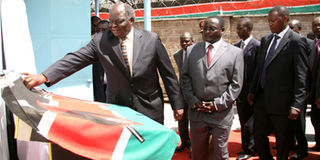Digital TV now a reality in Kenya

President Kibaki unveils a plaque during the launching of the Digital TV at the Kenya Broadcasting Corporation in Nairobi, December 9th, 2009. He is with Assistant minister for Information George Khaniri. Photo/STEPHEN MUDIARI
Kenya became the second African country to switch to digital television on Wednesday
At exactly 12.08pm, President Kibaki led the country in migrating from the analogue to the digital terrestrial television broadcasting signal.
“We have now moved to another world,” said the President during the launch at the Kenya Broadcasting Corporation studios in Nairobi.
As opposed to the analogue television signal, the digital signal provides for better picture and sound quality. It also offers multiple programming, through multi-casting, and provides for interactive capabilities.
More choice
Whereas a station broadcasting an analogue signal on, say channel 7, can only offer viewers one programme, a station broadcasting a digital signal can, through multi-casting, air one programme on channel 7-1, a second programme on channel 7-2 and a third one on channel 7-3. This means more programming choices for viewers.
Viewers with analogue TV sets will need to connect an inexpensive receiver (a converter box) to their sets in order to receive the digital signals.
KBC, the licensed signal distributor, has completed installing equipment to relay digital signals. “In Africa, only South Africa has fully embarked on the transition, which is partly driven by the Fifa World Cup. The International Telecommunications Union requires all countries to move to digital by 2015. However, Kenya will fully migrate by 2012,” President Kibaki said.
The move marked a new dawn for Kenya in the information communication and technology field as DTV is a major phenomenon since the invention of coloured television.
Information permanent secretary Bitange Ndemo said an individual with an analogue TV would require about Sh5,000 to buy a converter box to switch to digital TV. However, he was optimistic that the cost would come down.
President Kibaki also directed the Ministry of Finance and that of Information and Communications to provide tax relief for importation of new technologies.
The Information Ministry was further directed to educate Kenyans on DTV.
“Some of the benefits are superior image and sound clarity, interactive communication and data broadcasts and freeing up of more frequencies. Usage of DTV will be of great importance to Kenyans. It should be driven by need to expand services to all Kenyans,” the President said.
He said there will now be channels dedicated to youth, sports, tourism, science and culture.
Although there are currently 18 TV stations in the country, 60 applications are still pending. There are 60 FM radio stations while a further 150 applications are pending.
Following the launch, Phase One of the transition, covering Nairobi and its environs, was to start Wednesday.
Biggest shift
Dr Ndemo said most parts of the country would have been covered by the end of next year.
KBC managing director David Waweru said: “This is the moment we have all been waiting for. It is the biggest technological shift since the advent of colour TV. We are no longer in broadcast but ICT.”
He said the digital service will be accessible to all existing TV stations.
Ms Rose Kimotho, who spoke on behalf of the Media Owners Association, said the launch proved that Kenya had a working government and was a working country.
She said the new technology will increase employment and local content.
The Standard Group vice-chairman, Mr Paul Melly, said his organisation was ready for DTV.
“The field will be competitive. Our small concern is that the service provider is KBC, which is owned by the government. We want to be assured it will play its role properly,” he said.
Communications Commission of Kenya chairman said 70 per cent of population are to benefit from the project that is to cost Sh3 billion when completed. Currently Sh200 million has been used.
Assistant minister George Khaniri said DTV will mainly benefit youth who are major consumers of ICT and that it will make KBC more important to the nation than before.
Mr Khaniri however regretted that KBC was suffocating from a Sh20 billion debt, which has risen from Sh3 billion it took from the Japanese government in 1991 and obsolete machines and that it urgently needed assistance.
DTV, he was however, happy will help cut down cost of electricity from the Sh25 million per month that KBC currently pays.
He said every school should have a digital TV by 2012 and urged the government to speed up provision of necessary infrastructure.
Finance Minister Uhuru Kenyatta described DTV as a major milestone for Kenya and that it will help in early achievement of Vision 2030.
Before the 2010 World Cup, Kenyans in Webuye, Nyeri, Mombasa, Kisumu, Nakuru, Eldoret, Meru, Kisii and Malindi will be able to watch the games on digital channels.




